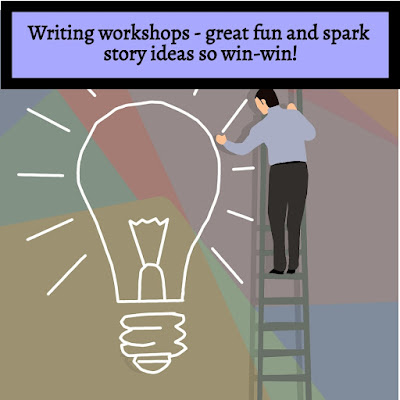Getting the Most from a Writing Workshop by Allison Symes
Image Credit: Images created in Book Brush using Pixabay photos.
There are no hard rules for getting the most from a writing workshop but I’ve found the following tips handy.
- Go with an open mind. I’ve gone to workshops not obviously in my field yet discovered information I’ve found useful later.
- Notebooks and pens are still useful. Sometimes it’s quicker to take something down the old school way. Neither are there any worries about your PC battery dying or if there are enough power points so you can re-charge (the machine, rather than you. We have tea and coffee!).
- If writing exercises are set, give them a go. You’ve got nothing to lose trying and may find you have a story, or at least the beginning of one, emerging you can finish at home.
- Do finish those exercises later, polish them, and get them out there. I’ve had work published that way.
- Don’t worry about reading exercises out if the tutor asks. Nobody expects perfection. What you’ve just jotted down can only be a first draft. People know this. Usually others are glad someone has read something out and it encourages others. You can learn from how other writers approached the exercise. They in turn can learn from how you approached it.
- If you read out your response to an exercise, read slowly. It’s a battle to suppress your nerves here but nobody will judge you. They are interested in discovering what you wrote. When you listen to others reading their work, aren’t you listening with that same interest? Read slowly, breathe deeply, and remember you’re contributing to the workshop in a way others can learn from. Feedback can be useful too.
- If there are handouts, especially those with links, follow those up later. It will remind you of what you learned but these are meant to help you develop further. Following up links will open up other possibilities for you. All it costs is time.
- Try and have one or two questions to ask the tutor in case there is a Q&A session. There is no such thing as a silly question. Whatever you think of here, others will be thinking/would have thought. I like Q&A sessions as they’re great for getting discussions going and you can learn so much from those.
- At most workshops, there will be a range of writers. Some will be beginners. There will be more experienced writers looking to hone their craft further and plenty of writers who are in the “in between” stages! Asking what may seem like a silly question helps the tutor gauge the level attendees are at and that, in turn, can help them tailor future workshops.
- Have fun! You will get something useful out of the workshop you attend, whether it is deciding if a certain kind of writing is for you or not. That too is worth knowing.






Very good advice, especially about asking what seem like trivial questions. Don't they reckon that for every 1 person in a class who asks a question, there will be 10 others there who wanted to but thought they'd sound silly? That's why you usually get a chorus of 'Oh, I was wondering that too!' after The Brave One has asked the question.
ReplyDeleteThanks, Fran. There has to be a Brave One in every workshop! They're needed.
DeleteReally useful advice. Thanks and blessings.
ReplyDeleteYou're welcome, Sophia. Thank you.
DeleteGreat advice Allison. Thank you!
ReplyDeleteMany thanks, Deborah.
DeleteExcellent advice Allison. So wish I could be at the WOW weekend, but it just isn't possible!
ReplyDeleteMany thanks, Veronica. Will miss you at the WOW weekend.
DeleteAs always, trenchant advice Allison
ReplyDeleteThanks, Ruth.
DeleteThanks for the good advice ahead of the weekend. I needed that.
ReplyDeleteGreat advice as always. Thank you so much, Allison!
ReplyDelete